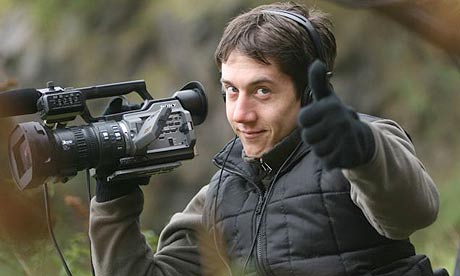
A teenager in a wheelchair rolling off a cliff, two disabled people whacking each other with ping-pong bats - if it wasn't so funny, there would be plenty of uncomfortable moments in Special People, a low-budget British film that delights in confounding expectations, not least by having its disabled characters played by disabled actors, a revolutionary idea in mainstream cinema.
Take Sasha Hardway, a 22-year-old who looks like a Hollywood star, and who walks with a very chic stick. In Special People, Hardway plays one of four teenagers given drama lessons by a patronising film director, hoping to use them to revive his flagging career and failed romance. The idea for the movie came from a group of disabled teenagers in Hereford, who improvised it into an award-winning short film with the help of director Justin Edgar (who has a hearing impairment) and able-bodied actor and co-writer Dominic Coleman. "The teenagers really were taking the piss out of Dominic," says Edgar. "These guys represent a gutsy new generation of disabled young people who won't take any shit. I found that inspiring."
For the feature-length version, Edgar found Hardway after his mother spotted her in the pages of the Big Issue. Hardway, who grew up in Essex, was funding her graphic design degree with a bit of modelling. She has a rare condition called dystonia, which has required spinal surgery and a wheelchair. "My mum noticed that other children were running around and I was getting left out," she says. "So she put me in a rock and pop choir and I got into performing." Acting seemed closed off to her: "When I was younger, there weren't any disabled actors. You tried to compare yourself to people on TV and the only person I saw in a wheelchair was on Sesame Street."
Hardway appears alongside David Proud, 25, who played a basketballer in the BBC children's drama Desperados. Proud, who has spina bifida, took A-level theatre studies (thanks to "the world's coolest drama teacher") but then settled for working in a job centre because, like Hardway, he couldn't imagine making a living out of acting.
Disabled actors playing disabled characters - let alone winning parts not specifically written as "disabled" - still seems beyond most mainstream film and television, despite 18% of British people recording a disability or long-term health problem in the 2001 Census. Disabled lives are often portrayed as a grim battle against the odds. "It shouldn't just be about the struggle," says Hardway. "It should be about what you're achieving." In Special People, the teenage characters are, ultimately, just teenagers; they fool around and fall in love.
Hardway and Proud clearly enjoyed making the film, shot in 13 days in Birmingham and the Malvern hills on an initial budget of just £35,000. Proud is pragmatic about taking disabled roles, but there aren't many about: "I've got an old Michael Caine quote, 'Use a difficulty' - use what you have, in a positive way. If you're bald, be the best bald actor. You've got to establish that first before you break that mould."
When it comes to Hollywood's treatment of disability, that mould is far from broken. The new film by Fernando Meirelles, Blindness, features Mark Ruffalo and Julianne Moore as blind characters. "Films have won Oscars with stars 'cripping up', as they call it: Born On the Fourth of July, My Left Foot, The Piano," says Edgar. "Why not have somebody with a real learning disability playing someone who's got a learning disability - rather than Sean Penn in I Am Sam? Alec Guinness got stick for playing an Indian in A Passage to India 20 years ago. We would like to see an age where you can't get away with an able-bodied actor 'cripping up'."
Struggling for funds, Edgar found support in an unlikely source: a firm of builders in Birmingham. Why was it so hard to get backing elsewhere? "People in the industry don't know enough about disability to think it could be a commercial film," he says. Astonishingly, Special People was given a 12A rating - alongside a warning that it contained "disability themes".
"It's a warm comedy," says Edgar. "Giving it a 'disability theme', as though we have to be warned away from disabled people, is bizarre. You wouldn't have the film censors saying 'black themes' for a Spike Lee film."
The stars of Special People hope to inspire younger disabled people. "It's not even just to make them want to act," says Hardway. "It's to make them feel better about themselves."
Next up for Edgar is The Hunger House, a film about the Nazis' treatment of disabled people. "Who knows where looking at the world from a disabled perspective may take us?" he says. "Seeing the world in a different way is what excites me about film".
• Special People is out tomorrow.

